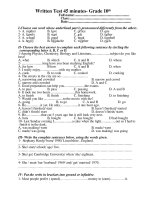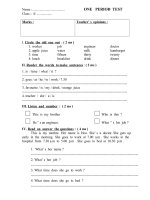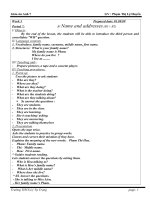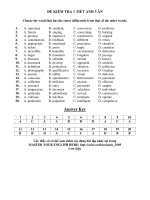ĐỀ KIỂM TRA 1 TIẾT ANH VĂN – ĐỀ 6 potx
Bạn đang xem bản rút gọn của tài liệu. Xem và tải ngay bản đầy đủ của tài liệu tại đây (60.42 KB, 3 trang )
ĐỀ KIỂM TRA 1 TIẾT ANH VĂN – ĐỀ 6
A. MAKE THE CORRECT CHOICE
:
1. Choose the word that has the underlined part pronounced differently from that of the others.
a. discuss b. jump c. argument d. public
2.
1. Choose the word that has the underlined part pronounced differently from that of the others.
a. excited b. excuse c. exchange d. example
3.
Choose the word that has the underlined part pronounced differently from that of the others.
a. approach b. attract c. decent d. install
4. Choose the word that has the underlined part pronounced differently from that of the others.
a.
verbal b. polite c. common d. social
5.
Choose the word that has the underlined part pronounced differently from that of the others.
a. compliment b. absolute c. fashionable d. suppose
6. Why did you object______ the scheme for building a kindergarten in our neighborhood?
a. to b. against c. at d. in
7. She received several compliments ______ her speech.
a. to b. on c. for d. about
8. They were very apologetic ______the trouble they'd caused.
a. on b. to c. about d. with
9. Dust storms most often occur in areas where the ground has little vegetation to protect ___ of
the wind.
a. from the effects b. it the effects
c. it from the effects d. the effected from it
10. He'll be very upset if you __________his offer 'of help.
a. turn away b. turn into c. turn off d. turn down
11. Despite being a big star, she's very ______.
a. approachable b. fashionable c. acceptable d. accessible
12. It's no more than common______ to hear what she has to say.
a. polite b. impolite c. politeness d. impoliteness
13. Gestures such as waving and handshaking are
______
forms of communication.
a. direct' b. regular c. verbal d. non-verbal
14. She was a devoted nurse, always very
______
to the needs of her elderly patients.
a. observant b. attentive c. careful d. delicate
15. I think access to cinemas and theaters is the main
______
of city life.
a. amenity b. attraction c. leisure d. recreation
16. I make no
______
for encouraging my children to succeed in school.
a. apologize b. apologetic c. apologies d. apoplectic
17. The visitors were complaining
______
in the rain.
a. for waiting b. me about waiting
c. about having to wait d. that they have to wait
18. By analyzing high pressure systems, fronts, and other influences, weather forecasters can
determine the direction toward which ______ to travel.
a. a storm is expected b. is expected a storm
c. is a storm expected d. an expected storm
19. The effects of cigarette smoking
______
to be extremely harmful so far.
a. is proved b. will be proved c. are proved d. have been proved
20. When I last
______
my cousin Lucy, she
______
hard preparing for her final exams.
a. saw - was working b. saw - worked
c. have seen - worked d. see - is working
21. The accused denied
______
in the vicinity of the murder scene.
a. to have ever been b. have ever been
c. having been ever d. ever having been
22. She told me that she
______
physiology.
a. has studied b. has been studying
c. had been studying d. would have studied
23. The doctor has advised
______
too much coffee.
a. me not drink b. I don't drink c. me not drinking d. me not to drink
24. Angie warned
______
anyone what she had told me.
a. that I didn't tell b. that I told not c. me to tell not d. me not to tell
25. My mother told me
______
my books
______
about on the living room.
a. don't leave - lying b. didn't leave - lie
c. not to leave - lying d. not to leave - to lie
26. She wondered
______
now, after so many years away.
a. how her father looked like b. whose her father looks like
c. how her father looks like d. what her father looked like
27. Helen asked me
______
the film called 'Star Wars'.
a. if I saw b. whether I have seen c. if I had seen d. whether had I seen .
28. Many people believed that the more they produced and consumed ______.
a. they were the more affluent b. the more affluent they were
c. they were affluent more d. they were affluent
29. ______ that we had to ask a police officer for directions.
a. So confusing the map was b. So confusing was the map
c. So was confusing the map d. Such confusing was the map
30. She regretfully told him that ______.
a. she would leave the tickets at home b. she left the tickets at home
c. she would have left the tickets at home d. she had left the tickets at home
B.
IDENTIFY THE UNDRERLINED WORD OR PHRASE THAT IS INCORRECT:
31. The author has not rarely written anything that was not a best-seller.
A B C D
32. Ron said that he wasn't sure, but the storm might stop already.
A B C D
33. For many years people have wondered that life exists elsewhere in the universe.
A B C D
34. The woman accused to shoplift was found not guilty and was acquitted.
A B C D
35. For centuries, people have wondered why have they particular dreams while they sleep.
A B C D
C. CHOOSE THE SENTENCE WHICH IS CLOSET IN MEANING TO THE ONE ABOVE:
36. "Shall I help you with the washing-up, Jane?" John said.
A. John told Jane to help him with the washing-up. B. John asked if Jane should help him with the
washing-up.
C. John suggested helping Jane with the washing-up. D. John offered to help Jane with the washing-
up.
37. "What will you do if you have ten days off school?" he asked.
A. He asked me what will I do if I have ten days off school. B. He asked what I will do if I have ten
days off school.
C. He asked me what I would do if I had ten days off school. D. He asked what would I do if I had
ten days off school.
38. "You'd better apologize for being so rude," said my friend.
A. My friend advised me to apologize for being so rude. B. My friend offered me to apologize for
being so rude.
C. My friend warned me to apologize for being so rude. D. My friend suggested me apologizing for
being so rude.
39. "Good morning, Mary! How are you?" Henry said.
A. Henry said good morning Mary and asked how was she. B. Henry greeted Mary and asked how is
she.
C. Henry said good morning and asked Mary how she is. D. Henry greeted Mary and asked how
she was.
40. "Please don't leave until I come back," Sarah said.
A. Sarah told us do not leave until she comes back. B. Sarah asked us not leave until she came back.
C. Sarah told us not to leave until she came back. D. Sarah said to us to not leave until she comes
back
D. READ THE PASSAGE CAREFULLY AND MAKE THE CORRECT CHOICE:
Years ago there were many social rules and etiquette procedures (41)_______ introductions.
Some formal introductions between two people were (42)_______ by
letter by third party. A
person had to be very careful to weigh the importance of social class or status, age, and gender
when deciding (43)_______ person should be presented or introduced to the other person first. (44)
________, times have changed, and most of the social rules about introducing older people to
younger ones, women to men, and those in higher positions to those in lower positions have
changed, too. Many people now feel much more (45) _______ about making introductions.
In most situations, handshaking is (46) ________, but these days it is more often done than not-
especially in formal social or business settings. It's very common for one person (or both) to (47)
________a hand when meeting someone. If you are in this situation, and you are offered a hand to
shake, you should grasp it firmly and shake it briefly. People often tend to make some
(48)_____________about someone (49)_________ to their handshakes, so make sure yours is not
too weak or limp, not too hard, and not too long-lasting. (50) _________should be firm and brief.
41 a. involving b. including c. relating d. mentioning
42. a. done b. made c. taken d. served
43. a. that b. who c. whose d. which
44. a. Therefore b. In addition c. However d. Furthermore
45 a. anxious b. relaxed c. nervous d. comfortable
46 a. optional b. compulsory c. private d. formal
47 a. spread b. reach c. extend d. touch
48 a. arguments b. judgments c. introductions d. remarks
49 a. according b. depending c. regardless d. on account
50 a. That b. Yours c. Which d. It









